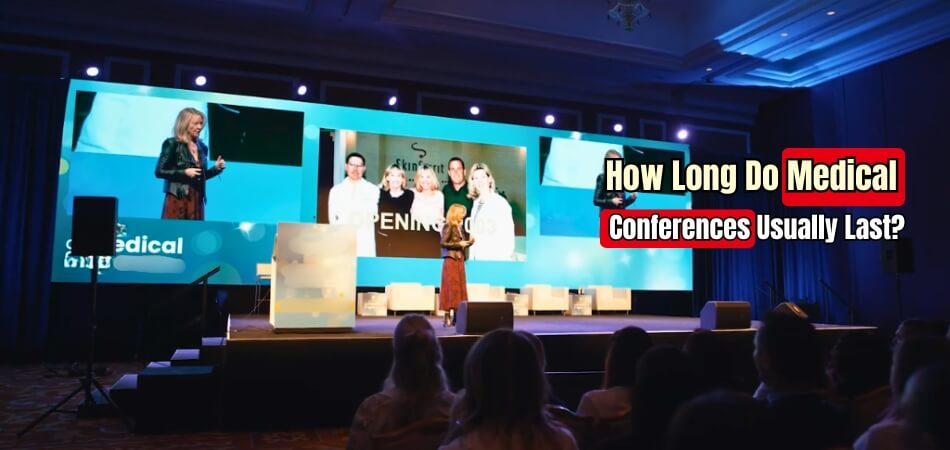Medical conferences allow healthcare professionals and regular attendees to stay up-to-date on healthcare developments, network with peers, and upgrade their skills. Usually, medical conferences can take place anywhere. But how long do medical conferences usually last?
Medical conferences usually last between 2 and 3 days. The duration is influenced by various factors, such as the conference’s scope, the number of sessions, and scheduled networking events. Larger conferences, featuring extensive programs and international participation, may last longer to cover multiple activities.
Would you like to know more about how these durations are planned? Stay tuned as we look in more detail into the factors that influence medical conferences’ length.
Why Time Management Matters for Medical Conference Attendees?
Time management is one of the most important aspects of attending a medical conference. These events are packed with sessions, workshops, and networking opportunities. Without a plan, it’s easy to miss out on valuable content and connections.
Effective time management allows attendees to engage in the most relevant sessions. Prioritizing keynotes and key discussions also contributes to learning and professional growth. Effective planning also allows time for exploring new technologies and innovations.
It is more challenging for overseas attendees to participate in an international medical conference. They need to balance time zones and travel fatigue. Efficient time management helps them maximize their conference experience and make the most of their journey.
How Long Do Medical Conferences Usually Last?
The healthcare sector relies heavily on medical conferences, which usually last between two and three days. Several factors influence the length of these conferences. Below are the full details about the factors:
Conference Scope
The breadth of topics covered greatly influences the duration of a medical conference. As the scope of the course expands, more time will be needed to introduce all relevant topics thoroughly. This helps participants receive a well-rounded experience, improving their knowledge of multiple topics. A wider scope can also develop interdisciplinary discussions that enrich the learning experience.
Number of Sessions
Conference length is also determined by the number of sessions scheduled. A greater number of sessions will require additional days to avoid overlapping and give each topic the attention it deserves. This arrangement allows attendees to gain maximum knowledge without rushing through sessions. Careful planning ensures that important subjects are adequately addressed.
Networking Events
Medical conferences cannot function without scheduled networking events. These are planned to encourage professional connections and collaborations. By incorporating these events into the conference, peer interaction will be increased. Networking sessions also provide opportunities for sharing insights and experiences that can lead to future partnerships.
Program Extensiveness
Conferences with extensive programs last longer. This allows all attendees to explore each topic in greater detail. By structuring the program properly, you can ensure that all subjects are covered thoroughly. A comprehensive agenda can also include panel discussions and Q&A sessions, enhancing engagement.
International Participation
Conferences with international attendees tend to last longer than those with domestic attendees. This addresses participants’ diverse time zones and travel schedules, particularly during an international medical conference, which aims to create collaboration. It also allows for a more inclusive and global discussion on medical advancements. Longer durations facilitate cross-cultural exchanges and collaborations among professionals.
Participant Workshops
The duration of conferences is also extended through workshops where participants actively participate in hands-on activities. In these workshops, attendees are expected to spend more time setting up, participating, and discussing, which upgrades their practical skills. These interactive sessions often lead to a deeper comprehension and application of the concepts presented.
Quality of Speakers
The caliber and number of notable speakers can also prolong a conference. High-profile speakers often attract larger audiences and may lead to expanded schedules to feature their presentations prominently. This strengthens the content and the overall conference appeal. Additionally, audience engagement with renowned speakers can lead to more dynamic discussions and interactions.
Popular Types of Medical Conferences You Can Attend
Conferences in the medical field offer unique opportunities to learn, network, and develop professionally. A medical conference can also be divided into different types based on the specialties and interests. Here are some popular types of medical conferences you can attend.
Specialty-Specific Conferences
Conferences focused on specific medical fields are called specialty conferences. Attendees gain deep insights into their specialty. These events often feature experts and pioneers. During workshops and sessions, attendees will learn about the latest research and techniques.
General Medical Conferences
General medical conferences cover a broad range of medical topics. They are ideal for multidisciplinary learning. Participants can explore various fields and innovations. Networking with professionals from various backgrounds is a key benefit.
Continuing Medical Education (CME) Conferences
CME conferences are essential for maintaining a medical license. These events provide updated medical knowledge and skills, making attending conferences as a medical student a valuable opportunity. Attendees earn the credits required for professional practice. During each session, you will hear lectures, participate in workshops, and engage in interactive discussions.
Healthcare Technology Forums
These forums showcase the latest in medical technology, from software to hardware advancements. By utilizing technology, patient care can be improved. They are essential for medical informatics and telemedicine professionals. Tech-savvy healthcare practitioners are attracted to the conference because innovation is a central theme.
Academic Medical Conferences
Medical research and education are the focus of academic conferences. It features presentations of the latest studies and findings. Also, researchers and educators share their work and ideas at this conference. This type of conference promotes collaboration and innovation in medicine.
Steps You Can Take to Plan for A Medical Conference
The preparation for a medical conference can be a rewarding experience that can help both personal and professional development. These conferences provide valuable opportunities for knowledge sharing, networking, and career development. Here’s a strategic way to ensure you’re thoroughly prepared for your next international medical conference:
Step 1: Select the Right Conference Using a Reliable Platform
You can choose conferences based on your professional goals on conference organizing websites like globalconference.ca. These platforms provide information about medical conferences around the world, including themes, speakers, and target audiences. By taking this first step, you can choose the career events that are most beneficial for your advancement.
Step 2: Register Early
Secure your spot at the conference by registering early. Early registration often provides advantages like reduced fees and better access to limited-capacity workshops. Also, early registration typically allows for better preparation, including arranging meetings with keynote speakers and other attendees.
Step 3: Book Travel and Accommodation Early
Make sure you arrange your travel and accommodation well in advance of the event. Early bookings can save significant money and provide a choice of convenient lodging near the conference venue. In addition to saving time, staying close to the event can help you network better.
Step 4: Plan Your Conference Schedule
Plan your days according to the conference program so that you don’t miss any sessions, workshops, or discussions that will help you advance in your professional career. When you plan your time effectively, you can engage fully with the content and network effectively without feeling rushed.
Step 5: Pack Essentials
You should prepare a conference kit that includes business cards, pens, notepads, and any necessary tech gadgets, such as a smartphone or laptop. It is also important for attendees to know what to wear at a medical conference. Keep it business casual or smart casual, depending on the norms of the conference.
Step 6: Engage Actively
Take advantage of your conference experience by engaging actively. Get involved in discussions, ask insightful questions, and network with other attendees. Also, it’s wise to be proactive because it improves your learning and opens new doors.
Benefits of Attending a Medical Conference
These days, attendees can easily get a life-changing experience by participating in medical conferences. Medical conferences offer a variety of benefits that can propel your professional and personal development. Here’s how involvement in medical conferences can be particularly advantageous:
- Updated Industry Knowledge: Medical conferences showcase the latest research and innovations. Become an expert and pioneer yourself by learning from leading experts.
- Networking Opportunities: Connect with peers and industry leaders who can influence your career trajectory. Such interactions often lead to collaborations and job opportunities.
- Professional Development: Through workshops and seminars, you can develop new skills. These competencies can advance your career and increase your professional value.
- Continuing Education: Many conferences offer professional education credits. These credits are essential for maintaining certifications and licenses.
- Presentation Skills: Presenting your research can improve your public speaking skills. This exposure is essential for professional growth and confidence building.
- Exposure to New Technologies: Discover the latest medical technologies and tools. Early adoption can improve your practice and patient care.
- Global Perspective: International conferences expose you to global health issues and solutions. This perspective is invaluable for broadening your knowledge of healthcare.
- Motivation and Inspiration: Listening to success stories and breakthroughs can revive your passion for medicine. Get inspired and more dedicated when you get back to work.
Tips for Maximizing Your Experience, Regardless of Duration
Attending a medical conference can be a significant investment of time and resources. To ensure you make the most of your experience, it’s essential to have a strategy in place, including knowing the ways to introduce yourself at a medical conference effectively.
Here are some practical tips to better your learning, networking, and overall enjoyment, no matter how long the conference lasts.
Plan Ahead
Before the conference, take time to review the agenda and identify key sessions that interest you. Setting clear goals will help you focus on what you want to achieve. Planning your schedule ensures you don’t miss important presentations or networking events. Use a planner or app to keep everything organized.
Engage Actively
Participate in discussions and ask questions during sessions. Engaging actively helps reinforce your learning and encourages interaction with speakers and peers. Take advantage of networking breaks to connect with others in your field. Building relationships can lead to valuable collaborations and knowledge sharing.
Take Quality Notes
Develop a note-taking system that works for you, whether digital or traditional. Capture key points, insights, and any questions that arise during presentations. Organizing your notes by topic can make it easier to review later. Quality notes will help you retain information and apply what you’ve learned.
Follow Up After the Conference
After the conference, take the time to follow up with new contacts. Send emails to express gratitude for conversations and share any insights you found valuable. Additionally, review your notes and summarize key takeaways to reinforce your learning. This follow-up can lead to ongoing professional relationships and opportunities.
Prioritize Self-Care
Don’t forget to take breaks and prioritize self-care during the event. Staying hydrated, eating well, and getting enough rest will keep your energy levels up. A clear mind and good health will increase your ability to absorb information and engage with others effectively. Balancing conference activities with personal well-being is essential for a rewarding experience.
Frequently Asked Questions
This section addresses common questions regarding the duration of medical conferences. Attendees can plan effectively for their conference experience by becoming familiar with the typical timelines and factors that influence them.
What Is the Best Way for Attendees to Get the Most Out of a Medical Conference?
Attendees can optimize their conference experience by prioritizing sessions aligned with their professional goals, participating in networking activities, and engaging actively in discussions. This approach ensures they derive maximum value from the event, regardless of its duration. Additionally, preparing questions in advance can develop interactions with speakers and peers.
Can Medical Conferences with Fewer Sessions Be Just as Beneficial as Longer Ones?
Yes, conferences with fewer but focused sessions can provide targeted learning opportunities and meaningful networking interactions. They allow attendees to concentrate on specific interests and engage deeply with content and peers. Often, the quality of interactions can outweigh the quantity of sessions offered.
Do Virtual Medical Conferences Have Similar Durations to In-Person Ones?
Virtual conferences often range from 1 to 3 days, mirroring the structure of traditional in-person events. They offer flexibility in attendance and participation while providing comparable educational content and networking opportunities. Many organizers strive to create engaging experiences that replicate the in-person format as closely as possible.
Can Medical Conferences Be Shorter than 2 Days?
While uncommon, certain specialized conferences or symposia may be condensed into a single-day or weekend format. These shorter events are designed to deliver focused content efficiently. They are often targeted at specific topics or skills, providing a concentrated learning experience.
Are There Industry Standards or Guidelines for Determining Optimal Conference Duration?
Industry associations and professional societies may offer guidelines or benchmarks to assist organizers in determining effective conference durations based on best practices and attendee expectations. These standards help ensure that the content is delivered in a way that maximizes engagement and learning. Additionally, feedback from previous attendees can inform future planning decisions.
Conclusion
There’s no doubt that medical conferences offer extensive opportunities for learning, networking, and professional development for healthcare professionals. In terms of content and format, these conferences are designed to meet the changing needs of the medical community.
When it comes to “How long do medical conferences usually last?” knowing the factors that guide these events can help attendees prepare effectively. With such preparation, they can fully engage with a variety of programs, gain insight from expert sessions, and form meaningful relationships.
By attending these conferences, attendees also have the opportunity to improve their skills, gain new knowledge, and advance their careers. This makes each conference an investment in their professional development.








